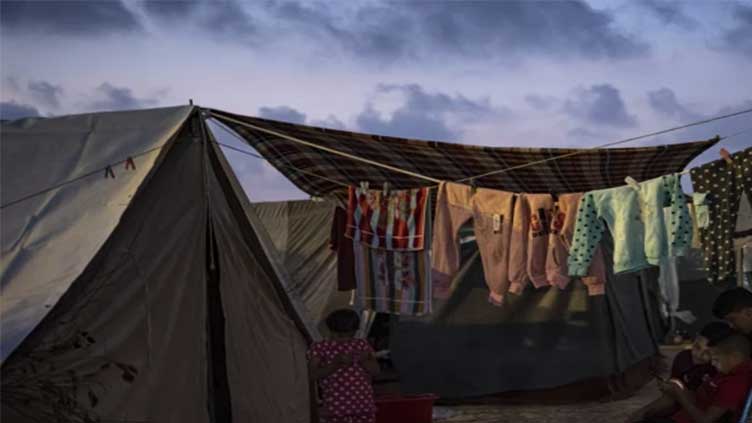Fights in bread lines, despair in shelters: War threatens to unravel Gaza's close-knit society

World
Fights in bread lines, despair in shelters: War threatens to unravel Gaza’s close-knit society
JERUSALEM (AP) — Fistfights break out in bread lines. Residents wait hours for a gallon of brackish water that makes them sick. Scabies, diarrhea and respiratory infections rip through overcrowded shelters. And some families have to choose who eats.
“My kids are crying because they are hungry and tired and can’t use the bathroom,” said Suzan Wahidi, an aid worker and mother of five at a U.N. shelter in the central town of Deir al-Balah, where hundreds of people share a single toilet. “I have nothing for them.”
With the Israel-Hamas war in its second month and more than 10,000 people killed in Gaza, trapped civilians are struggling to survive without electricity or running water. Palestinians who managed to flee Israel’s ground invasion in northern Gaza now encounter scarcity of food and medicine in the south, and there is no end in sight to the war sparked by Hamas’ deadly Oct. 7 attack.
Advertisement
Over half a million displaced people have crammed into hospitals and U.N. schools-turned-shelters in the south. The schools — overcrowded, strewn with trash, swarmed by flies — have become a breeding ground for infectious diseases.
Since the start of the war, several hundred trucks of aid have entered Gaza through the southern Rafah crossing, but aid organizations say that’s a drop in the ocean of need. For most people, each day has become a drudging cycle of searching for bread and water and waiting in lines.
The sense of desperation has strained Gaza’s close-knit society, which has endured decades of conflict, four wars with Israel and a 16-year blockade since Hamas seized power from rival Palestinian forces.
Some Palestinians have even vented their anger against Hamas, shouting insults at officials or beating up policemen in scenes unimaginable just a month ago, witnesses say.
Advertisement
“Everywhere you go, you see tension in the eyes of people,” said Yousef Hammash, an aid worker with the Norwegian Refugee Council in the southern town of Khan Younis. “You can tell they are at a breaking point.”
FILE - Palestinian kids who were displaced by the Israeli bombardment of the Gaza Strip watch at a phone in a UNDP-provided tent camp in Khan Younis, Wednesday, Nov. 1, 2023. With the Israel-Hamas war in its second month and more than 10,000 people killed in Gaza, trapped civilians are struggling to survive without electricity or running water. Each day has become a mind-numbing cycle of searching for bread and water and waiting in lines. A sense of desperation has strained Gaza's close-knit society. (AP Photo/Fatima Shbair, File)
Palestinian kids who were displaced by the Israeli bombardment of the Gaza Strip watch at a phone in a UNDP-provided tent camp in Khan Younis, Wednesday, Nov. 1, 2023. (AP Photo/Fatima Shbair, File)
Supermarket shelves are nearly empty. Bakeries have shut down because of lack of flour and fuel for the ovens. Gaza’s farmland is mostly inaccessible, and there’s little in produce markets beyond onions and oranges. Families cook lentils over small fires in the streets.
“You hear children crying in the night for sweets and hot food,” said Ahmad Kanj, 28, a photographer at a shelter in the southern town of Rafah. “I can’t sleep.”
Many people say they’ve gone weeks without meat, eggs or milk and now live on one meal a day.


